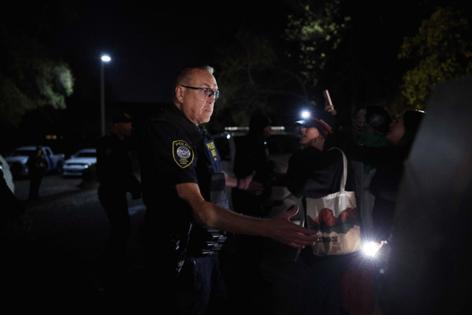Is Border Patrol's Operation Charlotte's Web in North Carolina at odds with book's lesson?
Published in News & Features
CHARLOTTE, N.C. — Federal immigration officials named their operation in Charlotte “Operation Charlotte’s Web” after the beloved children’s book by E.B. White. But critics, including White’s granddaughter, say it’s “antithetical” to the author’s values.
U.S. Border Patrol began its operation in Charlotte on Saturday and since, agents have detained 130 people. Masked agents wearing green uniforms apprehended people in public places, supermarkets, busy roadways and an east Charlotte church, The Charlotte Observer reported.
Gregory Bovino, who is leading the operation, leaned in to the “Operation Charlotte’s Web” moniker Sunday, posting a quote from the book on X: “‘Wherever the wind takes us. High, low. Near, far. East, west, North, south. We take to the breeze, we go as we please.’ — Charlotte’s Web,” the post stated. “This time, the breeze hit Charlotte like a storm.”
The Department of Homeland Security said the operation aims to “target the criminal illegal aliens who flocked to the Tar Heel State because they knew sanctuary politicians would protect them,” according to a Saturday news release.
But “Charlotte’s Web” author E.B. White’s granddaughter, Martha White, said the nickname is at odds with her grandfather’s values.
He “certainly didn’t believe in masked men, in unmarked cars, raiding people’s homes and workplaces without IDs or summons,” said White, who is also her grandfather’s literary executor, in a statement to CNN. “He didn’t condone fearmongering.”
Others took to social media to critique the name choice.
“There is no parent who has read Charlotte’s Web to a child who cannot be outraged by this,” Dan Shapiro, former U.S. ambassador to Israel, posted on X.
‘Charlotte’s Web’: A novel about compassion
Mark West is a professor of children’s and young adult literature in UNC Charlotte’s English department, where he teaches "Charlotte’s Web" on a regular basis.
The 1952 novel follows the story of an unlikely farmyard friendship between a spider named Charlotte and a pig named Wilbur. Charlotte saves Wilbur from the slaughter by weaving messages into her web that convince the farmer to keep him as a prize-winning pig instead.
“One of the things about Charlotte’s Web as a novel is that it is all about compassion — It’s all about taking responsibility for those who are vulnerable and putting yourself in another person’s shoes,” West told The Charlotte Observer. “All of those things are antithetical to what we see going on with the so-called Operation Charlotte’s Web.”
West said the name is also at odds with White’s legacy more broadly. White published a collection of essays written between 1943 and 1946 called "The Wild Flag," mostly focused on efforts to establish the United Nations during World War II.
“The United States is regarded by people everywhere as a dream come true, a sort of world-state in miniature. Here dwell the world’s emigrants under one law, and the law is: Thou shalt not push thy neighbor around.” White wrote in the book. “By some curious divinity which in him lies, Man, in this experiment of mixed races and mixed creeds, has turned out more good than bad, more right than wrong, more kind than cruel, and more sinned against than sinning. This is the world’s hope and its chance.”
This message, West said, is “antithetical” to Operation Charlotte’s Web.
“(DHS) probably thought it was clever because it has the word Charlotte in it,” he said. “But (the operation) is completely contrary to the things E.B. White wrote about.”
_____
©2025 The Charlotte Observer. Visit charlotteobserver.com. Distributed by Tribune Content Agency, LLC.







Comments